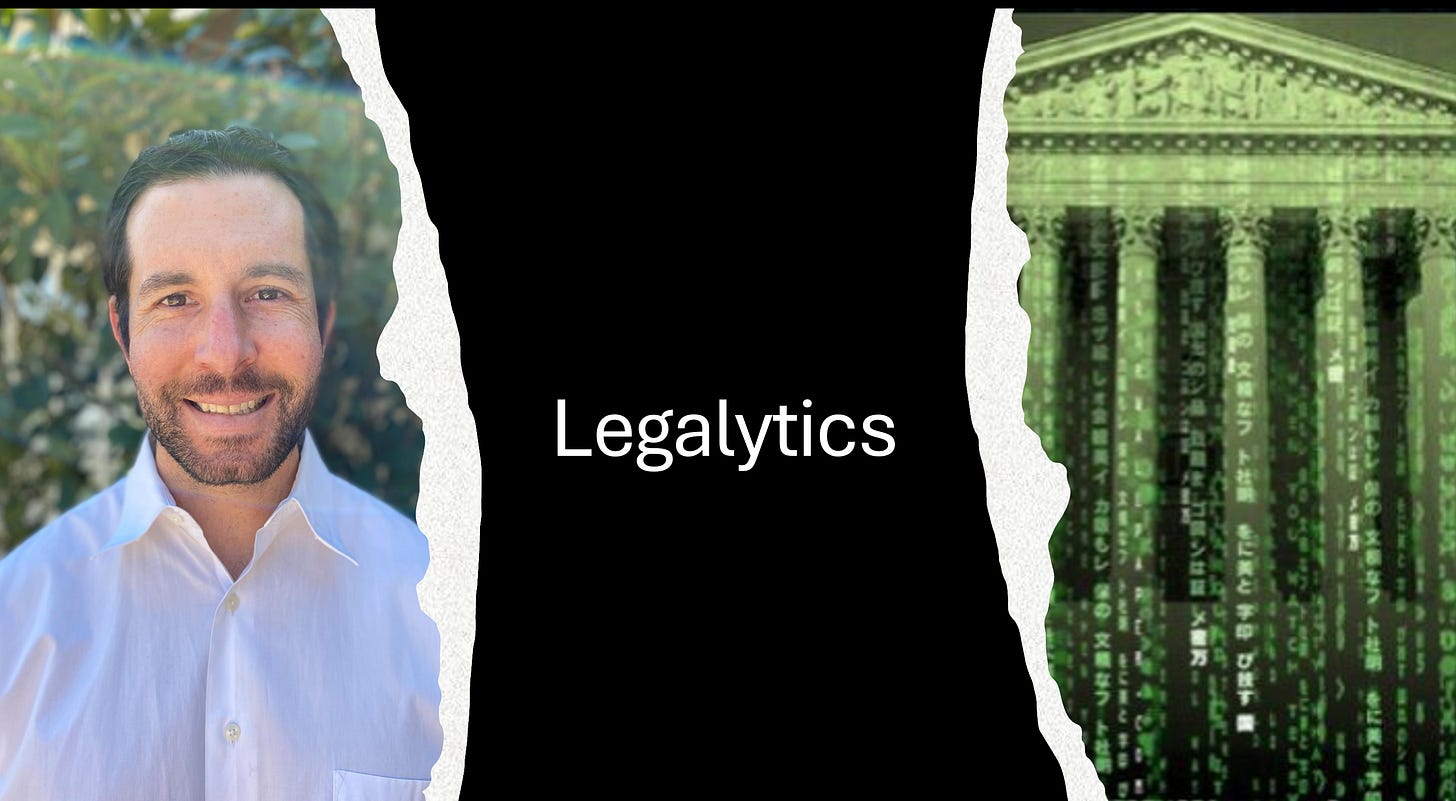What is Legalytics?
There are tons of talking heads that provide legal analysis. You can turn to the left, right, and center and there are pundits who speak to your political profile. This is something different. Legalytics aims to provide balanced analysis of the law but equally important is that it strives to provide a different perspective than you will find anywhere else.
The legal industry is in flux. It is adjusting to AI, big data, and modern technologies and methodologies. Legalytics’ focus is a data driven approach to law. Articles contain detailed analyses, oftentimes steeped in statistics and analytics, providing an alternative perspective that is not elsewhere available. The statistics are and will be simple enough for any reader to understand.
About the Author
Dr. Adam Feldman wears many different hats and has a unique and varied background blending both qualitative and quantitative elements. After college Adam completed a J.D. from the University of California, Berkeley School of Law (Boalt Hall). He was then a trial litigator in big and small law firms in Century City (Los Angeles), California.
With a heightened interest in applying analytics to law, Adam went back to graduate school to pursue and complete a Ph.D. in Political Science from the University of Southern California and then a postdoctoral fellowship from Columbia Law School in New York.
Along the way Adam started the blog Empirical SCOTUS and the consulting business Optimized Legal. Along with a partner he is also designing specialized software tools to take advantage of new technologies’ application to automating legal processes. Adam was also the statistics editor for SCOTUSBlog for several years and has articles on both Above the Law and Bloomberg Law.
Adam has taught law school and college level courses at the intersection of law and political science and currently adjuncts in such roles including most recently at California State University Northridge.
Adam’s work has been cited by and featured in numerous periodicals along the way including: Time Magazine, the Economist, Bloomberg Big Law Business, the National Law Journal, Volokh Conspiracy / Reason.com, BuzzFeed, Legal Sports Report, CNN, Empirical Legal Studies Blog, Texas Standard / NPR, Mother Jones, Colorado Springs Gazette, The American Lawyer, Yahoo News, FactsPress, the Colorado Independent, US News & World Report, ESPN, Washington Post, Standard-Examiner, Huffington Post, The Root, New Republic, Slate, Washington Examiner, Law 360, Daily Caller, Houston Chronicle, Vanity Fair, Reuters, FindLaw Supreme Court, Mic, Sports Illustrated, Business Insider, LexTalk, Los Angeles Daily Journal, General Counsel News, Fox News, USA Today, CQ Roll Call, CNBC, WGN Radio, Vox, The Hill, FiveThirtyEight, PBS News Hour, and Barrons. He has also appeared on dozens of podcasts for both local and national audiences.
Why Legalytics?
Analytics exist in almost every industry. Adam first began paying attention to analytics and statistical comparisons with respect to baseball, the first professional sport where teams utilized analytics to improve decision making (or at least where there was largescale coverage of the impact of analytics). Now there is an annual sports analytics conference at MIT that appeal to sports fans and statisticians alike.
Currently everything from medical professionals to consumer behavioralists to economists use analytics to make more efficient, effective, and strategic decisions and ultimately to improve techniques and increase profit.
There are some analytics currently accessible in law in off the shelf measures that are behind large paywalls and are designed for attorneys to use in particular situations where they want to make the best decisions on the margins. Generally these relate to timetables for judges’ decisions at the trial level. The goal of Legalytics is to leverage analytics and to show how they may help everyone understand the legal landscape through a comparative lens. It is to showcase applications, educate others, and to provide access to practitioners, scholars, and the interested public with resources answering new and innovative questions.
For those that have enjoyed Empirical SCOTUS the methodologies here are similar but the applications are much more varied. The fodder for analysis on this site will be both state and federal courts from the trial court level up through appeals and petitions to the U.S. Supreme Court. The data will be much more extensive and time consuming to collect. This leads into the reason for paid subscriptions. While I will still provide Empirical SCOTUS posts for free, having paid subscriptions allows me more time to research and develop data for each post as well as to pay for resources needed to produce, organize, and synthesize the data.
What to Expect
Coming full circle, the content on this Substack is diverse and will be multifaceted. Most newsletters will contain multiple sections including something for those with little legal knowledge (a case explainer), a data driven analysis of a research question, and some general analytics of judges and practicing attorneys. There will be a smattering of content particular to law students, lawyers, judges, those with a general political interest, and those that want to begin learning about the courts and their role in interpreting the law. The gist is that this should be accessible to almost everyone from high school students on up with a wide range of court-related content. As the audience develops, I’ll tailor the material towards subscribers’ interests. The content will also build over time with the addition of a podcast and more.
Subscribe to get full access to the newsletter and publication archives.



